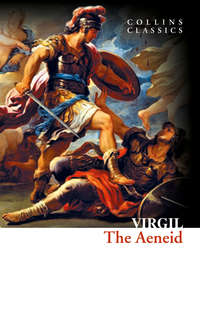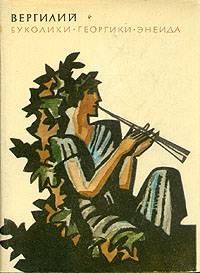 полная версия
полная версияThe Aeneid of Virgil
'"War is it for your slaughtered oxen and steers cut down, O children of Laomedon, war is it you would declare, and drive the guiltless Harpies from their ancestral kingdom? Take then to heart and fix fast these words of mine; which the Lord omnipotent foretold to Phoebus, Phoebus Apollo to me, I eldest born of the Furies reveal to you. Italy is your goal; wooing the winds you shall go to Italy, and enter her harbours unhindered. Yet shall you not wall round your ordained city, ere this murderous outrage on us compel you, in portentous hunger, to eat your tables with gnawing teeth."
'She spoke, and winged her way back to the shelter of the wood. But my comrades' blood froze chill with sudden affright; their spirits fell; and no longer with arms, nay with vows and prayers they bid me entreat favour, whether these be goddesses, or winged things ill-ominous and foul. And lord Anchises from the beach calls with outspread hands on the mighty gods, ordering fit sacrifices: "Gods, avert their menaces! Gods, turn this woe away, and graciously save the righteous!" Then he bids pluck the cable from the shore and shake loose the sheets. Southern winds stretch the sails; we scud over the foam-flecked waters, whither wind and pilot called our course. Now wooded Zacynthos appears amid the waves, and Dulichium and Same and Neritos' sheer rocks. We fly past the cliffs of Ithaca, Laërtes' realm, and curse the land, fostress of cruel Ulysses. Soon too Mount Leucata's cloudy peaks are sighted, and Apollo dreaded of sailors. Hither we steer wearily, and stand in to the little town. The anchor is cast from the prow; the sterns are grounded on the beach.
'So at last having attained to land beyond our hopes, we purify ourselves in Jove's worship, and kindle altars of offering, and make the Actian shore gay with the games of Ilium. My comrades strip, and, slippery with oil, exercise their ancestral contests; glad to have got past so many Argive towns, and held on their flight through the encircling foe. Meanwhile the sun rounds the great circle of the year, and icy winter ruffles the waters with Northern gales. I fix against the doorway a hollow shield of brass, that tall Abas had borne, and mark the story with a verse: These arms Aeneas from the conquering Greeks. Then I bid leave the harbour and sit down at the thwarts; emulously my comrades strike the water, and sweep through the seas. Soon we see the cloud-capped Phaeacian towers sink away, skirt the shores of Epirus, and enter the Chaonian haven and approach high Buthrotum town.
'Here the rumour of a story beyond belief comes on our ears; Helenus son of Priam is reigning over Greek towns, master of the bride and sceptre of Pyrrhus the Aeacid; and Andromache hath again fallen to a husband of her people. I stood amazed; and my heart kindled with marvellous desire to accost him and learn of so strange a fortune. I advance from the harbour, leaving the fleet ashore; just when haply Andromache, in a grove before the town, by the waters of a feigned Simoïs, was pouring libation to the dust, and calling Hector's ghost to a tomb with his name, on an empty turfed green with two altars that she had consecrated, a wellspring of tears. When she caught sight of me coming, and saw distractedly the encircling arms of Troy, terror-stricken at the vision marvellously shewn, her gaze fixed, and the heat left her frame. She swoons away, and hardly at last speaks after long interval: "Comest thou then a real face, a real messenger to me, goddess-born? livest thou? or if sweet light is fled, ah, where is Hector?" She spoke, and bursting into tears filled all the place with her crying. Just a few words I force up, and deeply moved gasp out in broken accents: "I live indeed, I live on through all extremities; doubt not, for real are the forms thou seest . . . Alas! after such an husband, what fate receives thy fall? or what worthier fortune revisits thee? Dost thou, Hector's Andromache, keep bonds of marriage with Pyrrhus?" She cast down her countenance, and spoke with lowered voice:
'"O single in happy eminence that maiden daughter of Priam, sentenced to die under high Troy town at an enemy's grave, who never bore the shame of the lot, nor came a captive to her victorious master's bed! We, sailing over alien seas from our burning land, have endured the haughty youthful pride of Achilles' seed, and borne children in slavery: he thereafter, wooing Leda's Hermione and a Lacedaemonian marriage, passed me over to Helenus' keeping, a bondwoman to a bondman. But him Orestes, aflame with passionate desire for his stolen bride, and driven by the furies of crime, catches unguarded and murders at his ancestral altars. At Neoptolemus' death a share of his realm fell to Helenus' hands, who named the plains Chaonian, and called all the land Chaonia after Chaon of Troy, and built withal a Pergama and this Ilian citadel on the hills. But to thee how did winds, how fates give passage? or whose divinity landed thee all unwitting on our coasts? what of the boy Ascanius? lives he yet, and draws breath, thy darling, whom Troy's . . . Yet hath the child affection for his lost mother? is he roused to the valour of old and the spirit of manhood by his father Aeneas, by his uncle Hector?"
'Such words she poured forth weeping, and prolonged the vain wail; when the hero Helenus son of Priam approaches from the town with a great company, knows us for his kin, and leads us joyfully to his gates, shedding a many tears at every word. I advance and recognise a little Troy, and a copy of the great Pergama, and a dry brook with the name of Xanthus, and clasp a Scaean gateway. Therewithal my Teucrians make holiday in the friendly town. The king entertained them in his spacious colonnades; in the central hall they poured goblets of wine in libation, and held the cups while the feast was served on gold.
'And now a day and another day hath sped; the breezes woo our sails, and the canvas blows out to the swelling south. With these words I accost the prophet, and thus make request:
'"Son of Troy, interpreter of the gods, whose sense is open to Phoebus' influences, his tripods and laurels, to stars and tongues of birds and auguries of prosperous flight, tell me now,—for the voice of revelation was all favourable to my course, and all divine influence counselled me to seek Italy and explore remote lands; only Celaeno the Harpy prophesies of strange portents, a horror to tell, and cries out of wrath and bale and foul hunger,—what perils are the first to shun? or in what guidance may I overcome these sore labours?"
'Hereat Helenus, first suing for divine favour with fit sacrifice of steers, and unbinding from his head the chaplets of consecration, leads me in his hand to thy courts, O Phoebus, thrilled with the fulness of the deity, and then utters these prophetic words from his augural lips:
'"Goddess-born: since there is clear assurance that under high omens thou dost voyage through the deep; so the king of the gods allots destiny and unfolds change; this is the circle of ordinance; a few things out of many I will unfold to thee in speech, that so thou mayest more safely traverse the seas of thy sojourn, and find rest in the Ausonian haven; for Helenus is forbidden by the destinies to know, and by Juno daughter of Saturn to utter more: first of all, the Italy thou deemest now nigh, and close at hand, unwitting! the harbours thou wouldst enter, far are they sundered by a long and trackless track through length of lands. First must the Trinacrian wave clog thine oar, and thy ships traverse the salt Ausonian plain, by the infernal pools and Aeaean Circe's isle, ere thou mayest build thy city in safety on a peaceful land. I will tell thee the token, and do thou keep it close in thine heart. When in thy perplexity, beside the wave of a sequestered river, a great sow shall be discovered lying under the oaks on the brink, with her newborn litter of thirty, couched white on the ground, her white brood about her teats; that shall be the place of the city, that the appointed rest from thy toils. Neither shrink thou at the gnawn tables that await thee; the fates will find a way, and Apollo aid thy call. These lands moreover, on this nearest border of the Italian shore that our own sea's tide washes, flee thou: evil Greeks dwell in all their towns. Here the Locrians of Narycos have set their city, and here Lyctian Idomeneus beset the Sallentine plains with soldiery; here is the town of the Meliboean captain, Philoctetes' little Petelia fenced by her wall. Nay, when thy fleets have crossed overseas and lie at anchor, when now thou rearest altars and payest vows on the beach, veil thine hair with a purple garment for covering, that no hostile face at thy divine worship may meet thee amid the holy fires and make void the omens. This fashion of sacrifice keep thou, thyself and thy comrades, and let thy children abide in this pure observance. But when at thy departure the wind hath borne thee to the Sicilian coast, and the barred straits of Pelorus open out, steer for the left-hand country and the long circuit of the seas on the left hand; shun the shore and water on thy right. These lands, they say, of old broke asunder, torn and upheaved by vast force, when either country was one and undivided; the ocean burst in between, cutting off with its waves the Hesperian from the Sicilian coast, and with narrow tide washes tilth and town along the severance of shore. On the right Scylla keeps guard, on the left unassuaged Charybdis, who thrice swallows the vast flood sheer down her swirling gulf, and ever again hurls it upward, lashing the sky with water. But Scylla lies prisoned in her cavern's blind recesses, thrusting forth her mouth and drawing ships upon the rocks. In front her face is human, and her breast fair as a maiden's to the waist down; behind she is a sea-dragon of monstrous frame, with dolphins' tails joined on her wolf-girt belly. Better to track the goal of Trinacrian Pachynus, lingering and wheeling round through long spaces, than once catch sight of misshapen Scylla deep in her dreary cavern, and of the rocks that ring to her sea-coloured hounds. Moreover, if Helenus hath aught of foresight or his prophecy of assurance, if Apollo fills his spirit with the truth, this one thing, goddess-born, one thing for all will I foretell thee, and again and again repeat my counsel: to great Juno's deity be thy first prayer and worship; to Juno utter thy willing vows, and overcome thy mighty mistress with gifts and supplications; so at last thou shalt leave Trinacria behind, and be sped in triumph to the Italian borders. When borne hither thou drawest nigh the Cymaean city, the haunted lakes and rustling woods of Avernus, thou shalt behold the raving prophetess who deep in the rock chants of fate, and marks down her words on leaves. What verses she writes down on them, the maiden sorts into order and shuts behind her in the cave; they stay in their places unstirred and quit not their rank. But when at the turn of the hinge the light wind from the doorway stirs them, and disarranges the delicate foliage, never after does she trouble to capture them as they flutter about the hollow rock, nor restore their places or join the verses; men depart without counsel, and hate the Sibyl's dwelling. Here let no waste in delay be of such account to thee (though thy company chide, and the passage call thy sails strongly to the deep, and thou mayest fill out their folds to thy desire) that thou do not approach the prophetess, and plead with prayers that she herself utter her oracles and deign to loose the accents from her lips. The nations of Italy and the wars to come, and the fashion whereby every toil may be avoided or endured, she shall unfold to thee, and grant her worshipper prosperous passage. Thus far is our voice allowed to counsel thee: go thy way, and exalt Troy to heaven by thy deeds."
'This the seer uttered with friendly lips; then orders gifts to be carried to my ships, of heavy gold and sawn ivory, and loads the hulls with massy silver and cauldrons of Dodona, a mail coat triple-woven with hooks of gold, and a helmet splendid with spike and tressed plumes, the armour of Neoptolemus. My father too hath his gifts. Horses besides he brings, and grooms . . . fills up the tale of our oarsmen, and equips my crews with arms.
'Meanwhile Anchises bade the fleet set their sails, that the fair wind might meet no delay. Him Phoebus' interpreter accosts with high courtesy: "Anchises, honoured with the splendour of Venus' espousal, the gods' charge, twice rescued from the fallen towers of Troy, lo! the land of Ausonia is before thee: sail thou and seize it. And yet needs must thou float past it on the sea; far away lies the quarter of Ausonia that is revealed of Apollo. Go," he continues, "happy in thy son's affection: why do I run on further, and delay the rising winds in talk?" Andromache too, sad at this last parting, brings figured raiment with woof of gold, and a Phrygian scarf for Ascanius, and wearies not in courtesy, loading him with gifts from the loom. "Take these too," so says she, "my child, to be memorials to thee of my hands, and testify long hence the love of Andromache wife of Hector. Take these last gifts of thy kinsfolk, O sole surviving likeness to me of my own Astyanax! Such was he, in eyes and hands and features; and now his equal age were growing into manhood like thine."
'To them as I departed I spoke with starting tears: "Live happily, as they do whose fortunes are perfected! We are summoned ever from fate to fate. For you there is rest in store, and no ocean floor to furrow, no ever-retreating Ausonian fields to pursue. You see a pictured Xanthus, and a Troy your own hands have built; with better omens, I pray, and to be less open to the Greeks. If ever I enter Tiber and Tiber's bordering fields, and see a city granted to my nation, then of these kindred towns and allied peoples in Epirus and Hesperia, which have the same Dardanus for founder, and whose story is one, of both will our hearts make a single Troy. Let that charge await our posterity."
'We put out to sea, keeping the Ceraunian mountains close at hand, whence is the shortest passage and seaway to Italy. The sun sets meanwhile, and the dusky hills grow dim. We choose a place, and fling ourselves on the lap of earth at the water's edge, and, allotting the oars, spread ourselves on the dry beach for refreshment: the dew of slumber falls on our weary limbs. Not yet had Night driven of the Hours climbed her mid arch; Palinurus rises lightly from his couch, explores all the winds, and listens to catch a breeze; he marks the constellations gliding together through the silent sky, Arcturus, the rainy Hyades and the twin Oxen, and scans Orion in his armour of gold. When he sees the clear sky quite unbroken, he gives from the stern his shrill signal; we disencamp and explore the way, and spread the wings of our sails. And now reddening Dawn had chased away the stars, when we descry afar dim hills and the low line of Italy. Achates first raises the cry of Italy; and with joyous shouts my comrades salute Italy. Then lord Anchises enwreathed a great bowl and filled it up with wine; and called on the gods, standing high astern . . . "Gods sovereign over sea and land and weather! bring wind to ease our way, and breathe favourably." The breezes freshen at his prayer, and now the harbour opens out nearer at hand, and a temple appears on the Fort of Minerva. My comrades furl the sails and swing the prows to shore. The harbour is scooped into an arch by the Eastern flood; reefs run out and foam with the salt spray; itself it lies concealed; turreted walls of rock let down their arms on either hand, and the temple retreats from the beach. Here, an inaugural sight, four horses of snowy whiteness are grazing abroad on the grassy plain. And lord Anchises: "War dost thou carry, land of our sojourn; horses are armed in war, and menace of war is in this herd. But yet these same beasts are wont in time to enter harness, and carry yoke and bit in concord; there is hope of peace too," says he. Then we pray to the holy deity, Pallas of the clangorous arms, the first to welcome our cheers. And before the altars we veil our heads in Phrygian garments, and duly, after the counsel Helenus had urged deepest on us, pay the bidden burnt-sacrifice to Juno of Argos.
'Without delay, once our vows are fully paid, we round to the arms of our sailyards and leave the dwellings and menacing fields of the Grecian people. Next is descried the bay of Tarentum, town, if rumour is true, of Hercules. Over against it the goddess of Lacinium rears her head, with the towers of Caulon, and Scylaceum wrecker of ships. Then Trinacrian Aetna is descried in the distance rising from the waves, and we hear from afar a great roaring of the sea on beaten rocks, and broken noises by the shore: the channels boil up, and the surge churns with sand. And lord Anchises: "Of a surety this is that Charybdis; of these cliffs, these awful rocks did Helenus prophesy. Out, O comrades, and rise together to the oars." Even as bidden they do; and first Palinurus swung the gurgling prow leftward through the water; to the left all our squadron bent with oar and wind. We are lifted skyward on the crescent wave, and again sunk deep into the nether world as the water is sucked away. Thrice amid their rocky caverns the cliffs uttered a cry; thrice we see the foam flung out, and the stars through a dripping veil. Meanwhile the wind falls with sundown; and weary and ignorant of the way we glide on to the Cyclopes' coast.
'There lies a harbour large and unstirred by the winds' entrance; but nigh it Aetna thunders awfully in wrack, and ever and again hurls a black cloud into the sky, smoking with boiling pitch and embers white hot, and heaves balls of flame flickering up to the stars: ever and again vomits out on high crags from the torn entrails of the mountain, tosses up masses of molten rock with a groan, and boils forth from the bottom. Rumour is that this mass weighs down the body of Enceladus, half-consumed by the thunderbolt, and mighty Aetna laid over him suspires the flame that bursts from her furnaces; and so often as he changes his weary side, all Trinacria shudders and moans, veiling the sky in smoke. That night we spend in cover of the forest among portentous horrors, and see not from what source the noise comes. For neither did the stars show their fires, nor was the vault of constellated sky clear; but vapours blotted heaven, and the moon was held in a storm-cloud through dead of night.
'And now the morrow was rising in the early east, and the dewy darkness rolled away from the sky by Dawn, when sudden out of the forest advances a human shape strange and unknown, worn with uttermost hunger and pitiably attired, and stretches entreating hands towards the shore. We look back. Filthy and wretched, with shaggy beard and a coat pinned together with thorns, he was yet a Greek, and had been sent of old to Troy in his father's arms. And he, when he saw afar the Dardanian habits and armour of Troy, hung back a little in terror at the sight, and stayed his steps; then ran headlong to the shore with weeping and prayers: "By the heavens I beseech you, by the heavenly powers and this luminous sky that gives us breath, take me up, O Trojans, carry me away to any land soever, and it will be enough. I know I am one out of the Grecian fleets, I confess I warred against the household gods of Ilium; for that, if our wrong and guilt is so great, throw me piecemeal on the flood or plunge me in the waste sea. If I do perish, gladly will I perish at human hands." He ended; and clung clasping our knees and grovelling at them. We encourage him to tell who he is and of what blood born, and reveal how Fortune pursues him since then. Lord Anchises after little delay gives him his hand, and strengthens his courage by visible pledge. At last, laying aside his terror, he speaks thus:
'"I am from an Ithacan home, Achemenides by name, set out for Troy in luckless Ulysses' company; poor was my father Adamastus, and would God fortune had stayed thus! Here my comrades abandoned me in the Cyclops' vast cave, mindless of me while they hurry away from the barbarous gates. It is a house of gore and blood-stained feasts, dim and huge within. Himself he is great of stature and knocks at the lofty sky (gods, take away a curse like this from earth!) to none gracious in aspect or courteous of speech. He feeds on the flesh and dark blood of wretched men. I myself saw, when he caught the bodies of two of us with his great hand, and lying back in the middle of the cave crushed them on the rock, and the courts splashed and swam with gore; I saw when he champed the flesh adrip with dark clots of blood, and the warm limbs quivered under his teeth. Yet not unavenged. Ulysses brooked not this, nor even in such straits did the Ithacan forget himself. For so soon as he, gorged with his feast and buried in wine, lay with bent neck sprawling huge over the cave, in his sleep vomiting gore and gobbets mixed with wine and blood, we, praying to the great gods and with parts allotted, pour at once all round him, and pierce with a sharp weapon the huge eye that lay sunk single under his savage brow, in fashion of an Argolic shield or the lamp of the moon; and at last we exultingly avenge the ghosts of our comrades. But fly, O wretched men, fly and pluck the cable from the beach. . . . For even in the shape and stature of Polyphemus, when he shuts his fleeced flocks and drains their udders in the cave's covert, an hundred other horrible Cyclopes dwell all about this shore and stray on the mountain heights. Thrice now does the horned moon fill out her light, while I linger in life among desolate lairs and haunts of wild beasts in the woodland, and from a rock survey the giant Cyclopes and shudder at their cries and echoing feet. The boughs yield a miserable sustenance, berries and stony sloes, and plants torn up by the root feed me. Sweeping all the view, I at last espied this fleet standing in to shore. On it, whatsoever it were, I cast myself; it is enough to have escaped the accursed tribe. Do you rather, by any death you will, destroy this life of mine."
'Scarcely had he spoken thus, when on the mountain top we see shepherding his flocks a vast moving mass, Polyphemus himself seeking the shores he knew, a horror ominous, shapeless, huge, bereft of sight. A pine lopped by his hand guides and steadies his footsteps. His fleeced sheep attend him, this his single delight and solace in ill. . . . After he hath touched the deep flood and come to the sea, he washes in it the blood that oozes from his eye-socket, grinding his teeth with groans; and now he strides through the sea up to his middle, nor yet does the wave wet his towering sides. We hurry far away in precipitate flight, with the suppliant who had so well merited rescue; and silently cut the cable, and bending forward sweep the sea with emulous oars. He heard, and turned his steps towards the echoing sound. But when he may in no wise lay hands on us, nor can fathom the Ionian waves in pursuit, he raises a vast cry, at which the sea and all his waves shuddered, and the deep land of Italy was startled, and Aetna's vaulted caverns moaned. But the tribe of the Cyclopes, roused from the high wooded hills, run to the harbour and fill the shore. We descry the Aetnean brotherhood standing impotent with scowling eye, their stately heads up to heaven, a dreadful consistory; even as on a mountain summit stand oaks high in air or coned cypresses, a high forest of Jove or covert of Diana. Sharp fear urges us to shake out the sheets in reckless haste, and spread our sails to the favouring wind. Yet Helenus' commands counsel that our course keep not the way between Scylla and Charybdis, the very edge of death on either hand. We are resolved to turn our canvas back. And lo! from the narrow fastness of Pelorus the North wind comes down and reaches us. I sail past Pantagias' mouth with its living stone, the Megarian bay, and low-lying Thapsus. Such names did Achemenides, of luckless Ulysses' company, point out as he retraced his wanderings along the returning shores.
'Stretched in front of a bay of Sicily lies an islet over against wavebeat Plemyrium; they of old called it Ortygia. Hither Alpheus the river of Elis, so rumour runs, hath cloven a secret passage beneath the sea, and now through thy well-head, Arethusa, mingles with the Sicilian waves. We adore as bidden the great deities of the ground; and thence I cross the fertile soil of Helorus in the marsh. Next we graze the high reefs and jutting rocks of Pachynus; and far off appears Camarina, forbidden for ever by oracles to move, and the Geloan plains, and vast Gela named after its river. Then Acragas on the steep, once the breeder of noble horses, displays its massive walls in the distance; and with granted breeze I leave thee behind, palm-girt Selinus, and thread the difficult shoals and blind reefs of Lilybaeum. Thereon Drepanum receives me in its haven and joyless border. Here, so many tempestuous seas outgone, alas! my father, the solace of every care and chance, Anchises is lost to me. Here thou, dear lord, abandonest me in weariness, alas! rescued in vain from peril and doom. Not Helenus the prophet, though he counselled of many a terror, not boding Celaeno foretold me of this grief. This was the last agony, this the goal of the long ways; thence it was I had departed when God landed me on your coasts.'








